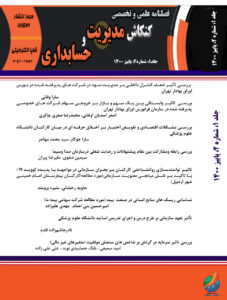مقاله: پژوهشی
صفحه: 48- 64
نویسندگان:
زهرا محمدپور [1]، فاطمه موحدنیا[2]، حسن مشجر[3]
[1] دکترای تخصصی مدیریت دولتی ، گرایش رفتار سازمانی Dr.zmohammadpour@gmail.com
[2] کارشناس ارشد مدیریت بازرگانی ، فارغ التحصیل از موسسه غیرانتفاعی سارویه Fatima.movahednia.1994@gmail.com
[3] دانشجوی کارشناسی ارشد، مدیریت دولتی ، دانشگاه غیر انتفاعی علامه حلی (ره)،چالوس،ایران.
چکیده
افراد در سازمانها تمایل شدیدی دارند که دوست داشته شده و مثبت دیده شوند . بیش از هر زمان دیگری جهان در حال تغییرات پی در پی است . بنابراین ، سازمانها به منظور مواجهه با چنین چالشی باید به نقش حیاتی یادگیری و توسعه در بقا و رشد خود واقف باشند . سازمان باید به توسعه دانش و مهارت ها و توانایی های کارکنان خود بیش از پیش توجه کند . این پژوهش با هدف بررسی تاثیر نظریه انتخاب عمومی و نظریه بازیها بر کنش حسابگرانه کارکنان صورت گرفته است. بر همین اساس ابتدا به بررسی و شناسایی عوامل و معیارهای انتخاب عمومی و نظریه بازی ها بر کنش حسابگرانه کارکنان از طریق تحلیل محتوای اسناد و مدارک پرداختیم که به روش گلوله برفی انتخاب شدند که بعد از اشباع نظری خروجی کار توسط نرم افزار مکس کیو دی آ نشان داده شد.سپس داده های حاصله توسط پرسشنامه (کمی و کیفی )در اختیار 14 خبره قرار گرفت و بعد از سه دور دلفی کیفی، زیر معیارها شناسایی شدو الگوی حاصله بدست آمد. بر اساس نتایج بدست آمده 8 زیر معیار بر کنش حسابگرانه کارکنان تاثیر دارد .
کلمات کلیدی:
نظریه بازی ها ، کنش حسابگرانه ،انتخاب عمومی، سازمان
Investigating the impact of public choice theory and game theory on employees’ calculating actions
abstract
People in organizations have a strong desire to be liked and seen positively. More than ever, the world is constantly changing. Therefore, in order to face such a challenge, organizations must be aware of the vital role of learning and development in their survival and growth. The organization should pay more attention to the development of knowledge, skills and abilities of its employees. This research has been done with the aim of investigating the effect of public choice theory and game theory on employees’ calculating behavior. Based on this, we first investigated and identified the factors and criteria of general selection and game theory on the calculating action of employees through the content analysis of documents and documents, which were selected by the snowball method after theoretical saturation of work output by Max QDA software. Then, the obtained data was provided to 14 experts through a questionnaire (quantitative and qualitative) and after three rounds of qualitative Delphi, sub-criteria were identified and the resulting pattern was obtained. Based on the obtained results, 8 sub-criteria have an effect on the accounting behavior of employees.
Keywords: Game theory, computational action, public choice, organization
